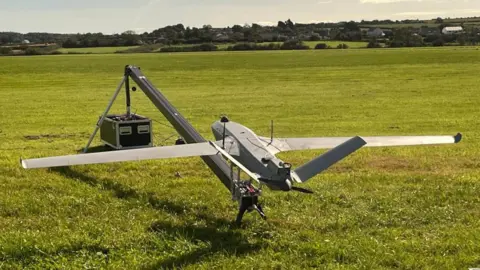Warning MoD weapons test could scramble GPS
 BBC
BBCElectronic weapons testing at a military base in Wales this week could affect navigation systems like GPS, drivers and pilots have been warned.
Radio signals targeting drone navigation systems will be fired on the Ministry of Defence's (MoD) Sennybridge range in Powys from 08:00 BST until 17:00 on Friday, possibly causing devices that use GPS to become inaccurate or go haywire.
Vehicles on the ground near the military exercise could be affected.
The interference is expected to reach higher altitudes, with the Civil Aviation Authority (CAA) issuing alerts for pilots and drone operators in most of mid and south Wales and as far south as Devon and Cornwall.
The zone extends up to 40,000 ft (12,200m), an altitude used by airliners.
Exercise Rock Lobster is the latest test of electronic warfare equipment and tactics, which have become more frequent since Russia's full invasion of Ukraine in 2022.
Tens of thousands of drones have been deployed during the conflict.
In the past two years, the MoD and industry partners have unveiled new technologies to combat the threat of military drones.
One is a directed energy weapon, called RF DEW, that uses a powerful beam of microwaves to fry electronics from a distance.
Another new weapon, a laser cannon called DragonFire incinerates drones at long range.
It is expected to be fitted to Royal Navy frigates and destroyers from 2027.
Meanwhile, the recent strategic defence review has given new emphasis on UK forces using drones.
British-Portuguese defence company Tekever has received hundreds of millions of pounds from the MoD for its drone technology, including the RAF's new StormShroud drone being developed at Parc Aberporth in Ceredigion.
